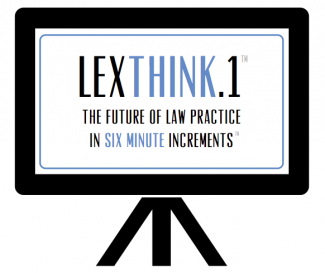Future of law includes big data, bigger competition and global jurisdictions

Lawyers be warned: Big data analytics, such as programs that predict settlement outcomes by a few percentage points, computers that universally interpret and comprehend state and international laws, and competitors who deliver legal services more quickly, cheaply and successfully than traditional bricks-and-mortar law offices are permanently shifting the legal landscape.
Disruption of the legal marketplace was the dominant theme at last night’s ABA Techshow kickoff event, LexThink.1: The Future of Law Practice. The fast-paced program was an alternative to the traditional panel presentation model; the 10 speakers had only six minutes each to make their points with slides flashing beside them at 18-second intervals.
“Big data puts the pieces together, sees relationships form, applies the concrete to the abstract and let’s us know big things early in cases,” said speaker Roe Frazer, a legal tech entrepreneur who founded Cicayda, a start-up that takes aim at the booming e-discovery industry. Searching for major surprises in matters buried in vastly multiplying amounts of data has become near impossible for human eyes alone, which hover around 14 percent accurate, Frazer said. The faster lawyers grasp the importance of big data analytical programs, the quicker they will find the unknowns that will impact their clients.
While big data analytics can aid complex e-discovery, for many lawyers, technology-aided legal practice equates with virtual law practices that slash overhead costs and allow attorneys and clients the convenience of conducting business from different locations.
“The office is dead,” proclaimed speaker Matt Spiegel, co-founder of MyCase, a web-based practice management software for lawyers.
“If we can only advise clients by forcing them to come into our offices, we are destined to fail! We can offer exactly what RocketLawyer and LegalZoom does, but with more,” Spiegel said, referring to the online legal service giants that let clients create automated legal documents. LegalZoom’s dominance in the consumer law market was also referenced by presenter Mark Britton, founder, CEO and president of Avvo, an online directory that rates lawyers. Britton advised lawyers to emulate the vendors’ models and clearly offer entry-level legal solutions, such as simple wills, with transparent price policies that can be up-sold to address additional client needs.
For speaker Philip Rosenthal, the greater adoption of artificial intelligence will allow lawyers to complete those simple transactions, and complex matters, across state and international lines—and laws—without the need for local representation or interpretation.
“If you had machine-readable law, you could do quantitative studies and learn the impact of law and the right thing to do for policy,” said Rosenthal, president of FastCase, a legal research mobile app. “If we can all read the laws of the world, what happens to license and reciprocity rules for state law?”
As a result, lawyers can expect revolutionary changes to law schools, bar admissions, professional regulations, ethics, discipline and malpractice liability and insurance, Rosenthal said.
Other presenters included Jay Shepherd, founder of PreFix, which advises lawyers on pricing their services, and ABA staff counsel and Techshow favorite Will Hornsby, who presented ways lawyers can harness the public’s obsession and enjoyment of online games to expand access to legal services and solve broader social problems.
The theory behind the six-minute format is that it’s just long enough for a presenter to make the key points needed to educate and entertain an audience about a business model, new technology or whatever is on the speaker’s mind. It’s also organizer Matt Homann’s nod to the six-minute billing increment familiar to lawyers and vendors supporting the legal industry.
Updated at 4:46 p.m. to correct the number of speakers.



